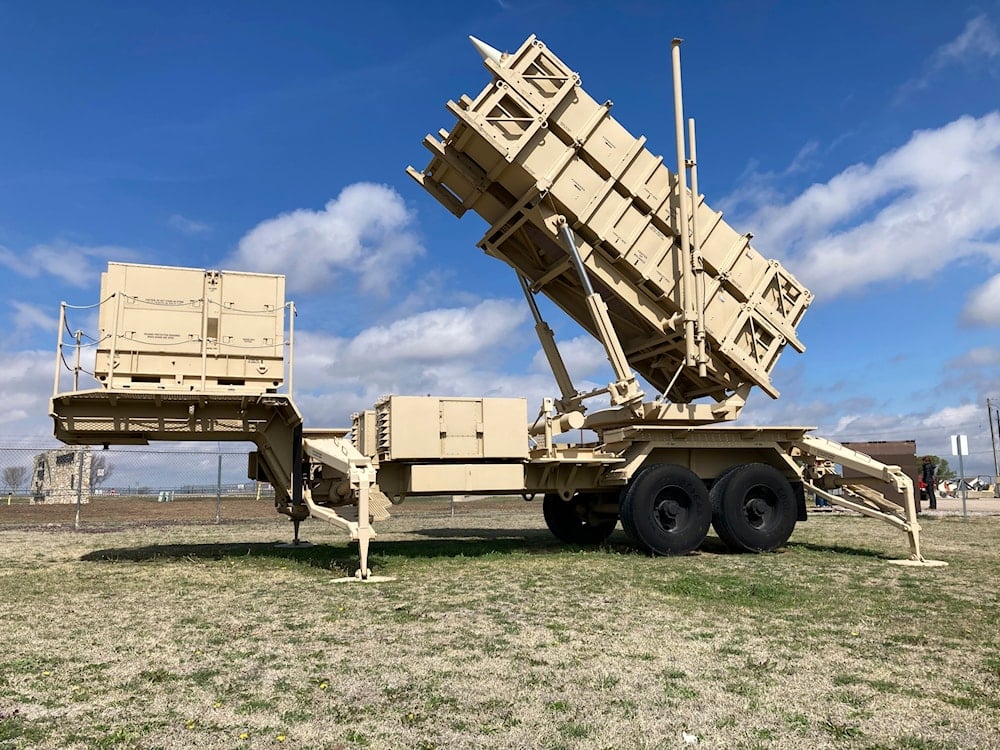US Patriot missile stockpile at 25% as Trump vows more arms to Ukraine
The US faces a missile shortage after "Israel’s" war on Iran, forcing aid delays to Ukraine despite Trump’s renewed weapons pledge.
-

A Patriot missile mobile launcher is displayed outside the Fort Sill Army Post near Lawton, Okla., on March 21, 2023. (AP Photo/Sean Murphy, File)
The United States’ reserve of Patriot missiles has dropped to approximately 25% of its total stockpile, even as former President Donald Trump pledges to send additional weapons to Ukraine, according to a report by The Guardian.
The report highlights growing concerns within the Pentagon over the sustainability of US military aid, particularly after recent military operations in West Asia placed further strain on critical defense assets.
Israeli war on Iran depletes US missile stockpile
The 12-day Israeli-imposed war on Iran significantly impacted US munitions reserves. Per the report, the US military expended nearly 30 Patriot missiles to help repel Iranian missile strikes against "Israel" last month.
As a result, the Pentagon’s supply of key air defense systems, particularly Patriot interceptors, has been severely depleted, raising concerns about the US military’s preparedness for potential conflicts elsewhere.
Pentagon temporarily halts some transfers to Ukraine
Due to the diminished supply, the Pentagon temporarily paused the transfer of specific munitions to Ukraine in June. This decision was part of a broader review of global military aid that began in February, the report adds.
The US Department of Defense is reportedly assessing its ability to sustain high-demand systems like the Patriot missile while meeting global commitments, including to Kiev.
Despite the shortage, Trump announced on Monday that his administration plans to send “some more weapons” to Ukraine. However, he did not specify which systems would be included or whether Patriot missiles would form part of the new package.
Earlier on Tuesday, Axios reported that Trump had promised to send 10 Patriot interceptor missiles to Ukraine and assist in sourcing additional military supplies.
Lockheed Martin and the high cost of Patriot systems
Patriot missiles, particularly the PAC-3 MSE variant, are manufactured by Lockheed Martin. According to US Army budget documents, each interceptor costs approximately $4.1 million.
Given the complexity and expense of replenishing these systems, US military planners are grappling with how to balance continued support for Ukraine with domestic defense needs.
Strategic concerns and global military aid review
On June 30, US media outlets reported that the Pentagon had suspended deliveries of certain precision-guided munitions and air defense systems to Ukraine. The move, officials indicated, was motivated by concerns over diminishing stockpiles.
White House spokeswoman Anna Kelly confirmed the suspension to NBC News. On July 7, Press Secretary Karoline Leavitt emphasized that the decision was part of a standard global audit of military assistance and not solely related to Ukraine.
Ukraine’s air defense lags despite US-led efforts
Since the start of the Russia-Ukraine war, Ukraine has received an estimated 6 to 8 Patriot air defense batteries from various sources, with over 1,000 Patriot missiles transferred, comprising both PAC-2 GEM-T and PAC-3 MSE variants. Despite this, Ukraine has requested at least 25 batteries for full airspace coverage, while President Volodymyr Zelensky has stated that even 10 systems would offer only minimal protection.
Direct US contributions include three Patriot batteries, as well as 90 missiles transferred from Israeli stockpiles through US mediation in January 2025. Trump’s newly announced delivery of 10 missiles, though fewer than the 30 originally planned, follows a temporary pause in shipments due to US shortages.
Financially, the US has provided $66.9 billion in military aid to Ukraine as part of more than $114 billion in total assistance, according to international tracking sources. Roughly 70% of this aid is spent within the US, supporting domestic arms manufacturers like Lockheed Martin. Despite such large-scale support, strategic concerns remain as European allies are now being urged to expand their own contributions to offset US limitations.
As Washington weighs its options, the dwindling supply of Patriot missiles underscores the challenges facing US military planners, namely, maintaining defense readiness while continuing extensive foreign military aid programs.

 4 Min Read
4 Min Read










